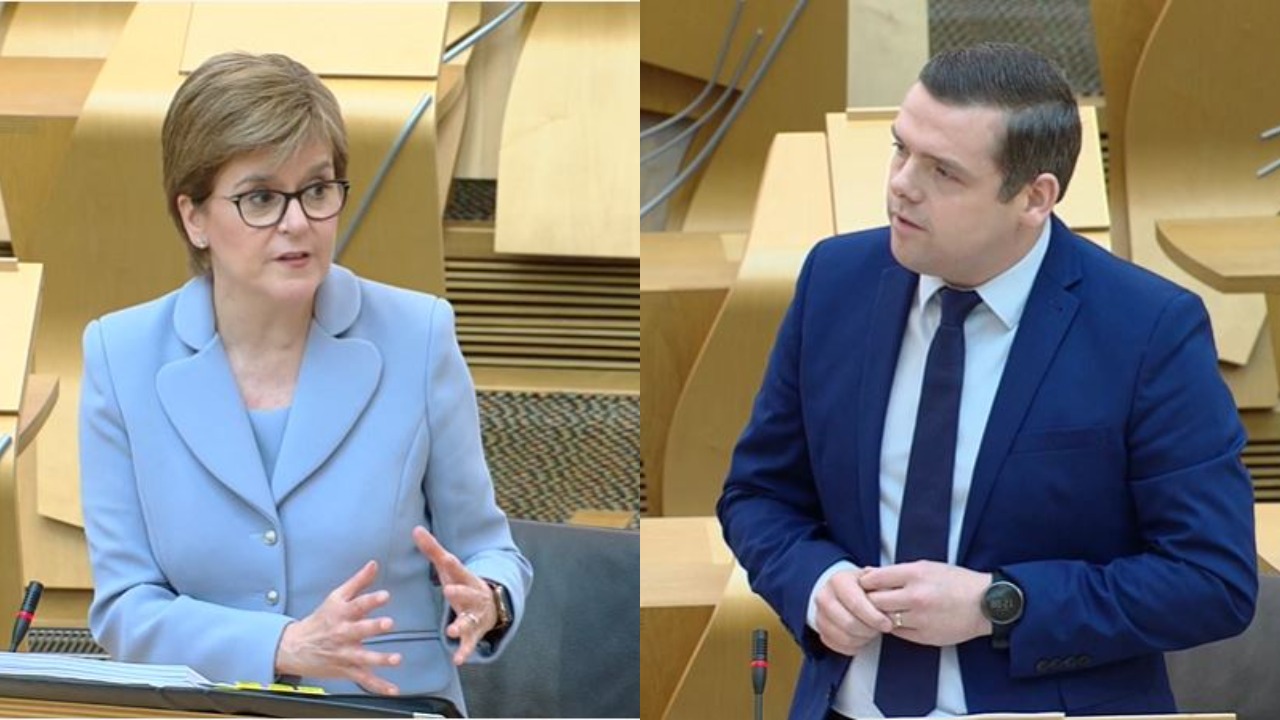Douglas Ross has said the system for awarding grades to pupils is the “same shambles as last year”, but that this year’s process is “more sleekit”.
It comes after an Education Scotland document stated that staff will be able to “analyse provisional results against three-year or five-year trends from historical data”.
Education secretary Shirley-Anne Somerville last week said that grades will be judged by teachers and not based on any algorithm, as she set out the new assessment system at Holyrood.
Raising the issue at First Minister’s Questions on Thursday, Scottish Conservative leader Ross challenged First Minister Nicola Sturgeon over the new system.
“Once again, young people will lose out based solely on where they go to school,” Ross told MSPs.
“This is the same shambles as last year, it’s just more sleekit because instead of the SQA marking pupils down at the end of the process, the system will force teachers and schools to do it first.
“How on earth can young people have confidence in this system when the First Minister’s words don’t match reality?”
Sturgeon said that no past results or algorithms dictate what an individual learner’s grade will be.
“What Douglas Ross is trying to suggest happens is simply not the case, so let me take the Chamber and those watching at home through the process,” she said.
“I’ve already set out that awards this year are based on teacher judgement. Teachers arrive at those judgements by looking at the attainment, the work that pupils have done.
“There are no past results or algorithms that dictate what an individual learner’s grade will be.”
She continued: “In terms of the quality assurance process that is in place, and I think everybody would expect some process like that to be in place, the only way in which a school’s past performance is looked at within their own local area is to identify whether a school overall might have provisional grades that appear to be significantly out of step with past performance.
“However, and this is the important part, if that happened, what happens then, not by the SQA, not by Education Scotland, but provisional grades are checked again by the relevant teachers and the key part is this – if the teacher’s judgement is that they stand by the result they gave, that result stands, it is not changed.
“So, it’s simply a checking procedure, but it ends in the same place where it is the teacher’s judgement based on the attainment of the pupil that determines the grade.”
Scottish Labour leader Anas Sarwar raised concerns around pupils with mitigating circumstances in the appeals process.
“The Government can try and deny it, but we are in the midst of a second exams crisis,” said Sarwar.
“In an unprecedented letter this week, many children’s organisations, the Scottish Youth Parliament, the parent’s groups, and leading academics, begged the First Minister to listen and ensure exceptional personal circumstances can be used to appeal grades.
“One such example is Ellie, a sixth year in Glasgow. Her case demonstrates why this is so important.
“She lost her mother in March of this year and despite being promised by this government there would be no exams, she found herself needing to sit several assessments, exams in all but name, there was no evidence available of her prior performance due to lockdown.
“Her lost education time has been exacerbated by grief. Does the First Minister believe that such circumstances would impact on Ellie’s performance in assessment?”
Sturgeon responded: “Yes, I do and this is not a question of whether or not the system recognises that, it is a question of how the system is recognising that.
“And I absolutely concede there are differences of opinion on this, but just to be clear about it, instead of somebody, and obviously I don’t know all of the circumstances of Ellie’s position, but somebody in that position instead of them going through the process to submit all of their evidence, getting a grade and then if it’s not the grade that they think they deserve, having to appeal, the system has built in contingency arrangements so that instead of having to submit that evidence by June 25, which is the deadline, they can have access to an extended period until September.
“So, it takes account of those circumstances, gives young people longer to get that evidence together and longer for their grade to be determined.”
Follow STV News on WhatsApp
Scan the QR code on your mobile device for all the latest news from around the country


 Scottish Parliament TV
Scottish Parliament TV

























